Enab Baladi’s Investigation Team
Investigation Team – Dia Odeh / Ninar Khalifa
During the seven rounds of Astana talks, the member states failed to reach an agreement on the issue of detainees in the prisons of the Syrian regime. Therefore, any decision about their release remained suspended. The eighth round took place in December 2017 and agreed to form a “working team”, focusing on detainees and missing people whose families still have a glimmer of hope that someday they will be able to know about their destiny.
In the aftermath of the Astana eighth round, the statements of the “Guarantor States”, namely Turkey, Russia, and Iran, confirmed that the “working team” will give a boost to the process of the release of the detainees. On the other hand, Turkey considered this step to establish confidence among the parties involved. The Ministry of Foreign Affairs of the Russian Federation declared the issue of detainees to be of great importance to the opposition as well as to the regime, for it involves tens of thousands of detainees.
Three rounds of Astana followed this agreement and signaled the launching of the “working team”. However, unexpectedly, the process of prisoners release has turned into swap deals. The Syrian regime has narrowed down the process from being a purely humanitarian issue, proving crimes including arbitrary arrest and enforced disappearance, torture, inhuman treatment, and sexual abuse, to war prisoners exchange deals.
The number of swap deals conducted since November 2018 until 22 April 2019, i.e. within five months, amounted to three. However, both parties to the deal mentioned neither the name-selection mechanisms nor criteria of those who are supposed to be released. They did not declare whether they are giving priority to “the most vulnerable” categories such as children, women and sick people, or choosing to release military commanders, fighters, prominent figures, and relatives of those responsible for exchange deals.
Many details have not been disclosed to Syrians, especially to the families of the detainees who were following the lists released by SANA agency and news websites after each exchange deal, hoping they could find the names of their siblings included in one of the lists.
In this file, Enab Baladi discusses the mechanism of previous and future swap deals that have been conducted between the Syrian regime and the opposition, under the auspices of the “Guarantor States”. The article also tackles the criteria of name selection process set by both parties and the extent to which the exchange deals have affected the issue of the detainees, considered as controversial for the states seeking a political solution, amid demands to neutralize this issue and spare it any political settlements.
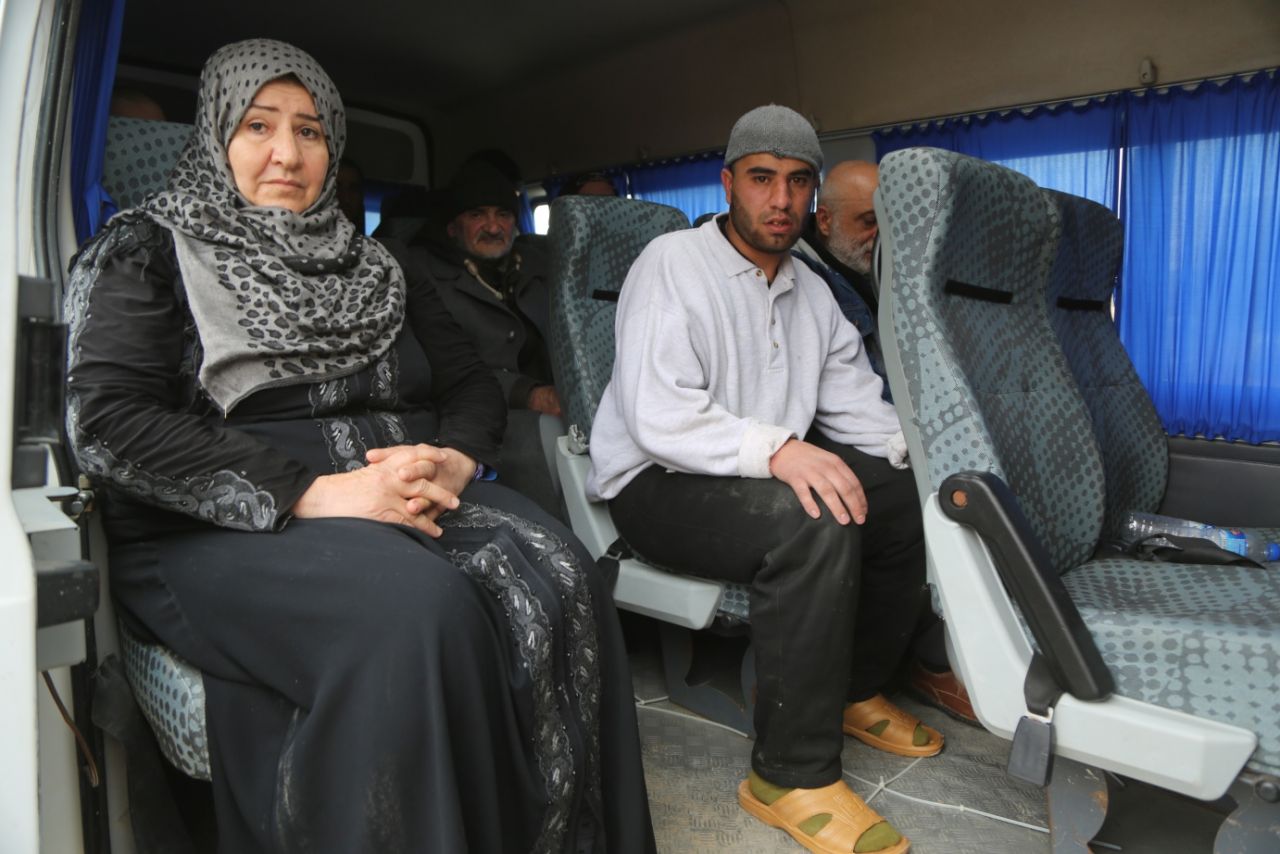
Released prisoners in swap deal between the regime and opposition in Aleppo countryside – November 2018 (AFP)
Is the opposition camouflaging facts or is it totally disconnected?
Article 10 of the Final Communiqué of the 11th round of the Astana talks of 28 and 29 November 2018 highlighted the “successful experience” involving the release of detainees and abductees, handing over dead bodies and identifying missing persons, under the umbrella of working group activities.
| Captive, detainee and prisoner defined by international law
Captive: a person held captive by the one of the members of the hostile armed forces. Detainee: A civilian, who is not involved in military operations, caught by the enemy forces. A captive and detainee are often confused despite the different definitions, legal status, and rights each one enjoys. Prisoner: Any person who commits an offense, a misdemeanor or a crime of any kind. He is punished according to his country’s laws. |
The statement considered the process of releasing detainees, which took place on 24 November 2018 (the first deal for the exchange), as a progress at the level of establishing confidence between the Syrian parties. Thereby, it has contributed to supporting the political process and the normalization of the reality on the ground, with an emphasis on commitment to sustainable progress as regard to the efforts of the “working team”.
The first deal was carried out at Abu al-Zindin crossing in eastern Aleppo, linking both the Syrian regime and the opposition. The regime released 20 detainees from its prisons in return of receiving 10 prisoners held by the opposition.
Syrian Arab News Agency (SANA) described the exchange deal, then, as “releasing ten abductees who were being held by the terrorist organizations in eastern Aleppo countryside”. Ayman al-Asmi, spokesman of the opposition’s delegation to Astana, told Enab Baladi during an interview, that the process was “a test to push the issue of the detainees forward and put it in practice. Both parties’ detainees were released at the same time rather than exchanged because we reject the swap of detainees.”
Two other deals were also conducted, the first was on 12 February and the second on 22 April, 2019, resulting in both sides releasing people, including women. However, name selection criteria remained vague and some of those names were only disclosed in the second deal.
Deals occurred suddenly and the opposition delegation did not declare any of them in advance. The lists, which include the names of those who were released, were not posted and received no media coverage after the completion of the deals thanks to which they were released.
What is most remarkable about those deals is being labeled as an “exchange of abductees” between the two parties, in order to divert attention from the issue of detainees in Syria and narrow it down to exchanging war prisoners. The Syrian regime confirmed this through its media coverage in the countryside of Aleppo, in the course of the completion of deals.
Enab Baladi tried to contact one of the women released in the second deal, in February 2019, but she did not respond to the questions. One of her relatives told Enab Baladi that she traveled to Turkey immediately after being released. He also said that the ones who were released and who arrived to opposition held areas requested to return to regime-held areas within days, for they had no security issues pending, and were arrested for “minor charges” at security checkpoints.
As for the Syrian opposition, Enab Baladi spoke to the head of the opposition delegation to Astana, Ahmad Tu’mah, who did not answer questions about the mechanism of names selection, and considered them as “embarrassing”. Col. Ahmed Osman, the leader of Sultan Murad Division”, taking part in the talks, said he is not familiar with swap deals, and has no answer to the questions mentioned earlier.
Likewise, Vice-President of the Syrian National Coalition, Badr Jamous, did not provide any answer when Enab Baladi contacted him to talk about the issue of detainees.
Conditional Release
In parallel with the implementation of the three exchange deals under Astana talks, the factions of the Syrian National Army were present on the other side of Abu al-Zindin crossing, focusing its work on coordination, away from implementing the details of the precise and planned mechanism, monitored by “Guarantor States”, namely the Turkish and Russian sides.
The spokesman for the National Army, Yousef Hamoud, said that the exchange deals were called “conditional release” and do not involve the detainees’ file.
Hamoud said that the National Army participated in the first and second exchange of prisoners and detainees by selecting the names of those released from the prisons of the Syrian regime. However, it had nothing to do with the third deal, which was conducted in April. He pointed out that the Syrian regime evaded several times, and sent names other than the selected ones in an attempt to “blur” the case.
The deals are conducted under Turkish-Russian supervision, according to Hamoud. He said that the names of detainees belonging to opposition are being selected after coordination with the Turkish side. There are conditions regarding the detainee’s status to ensure whether he is alive or not and in which detention center he is staying, so as to present the issue to Syrian regime as a fait accompli.
A spokesman for the National Army said that the last exchange, carried out on 22 April 2019, was a failure because the Syrian regime did not release the names mentioned in the agreed upon list, in an attempt to evade and dodge. However, the first and second deals were different, for the ones released were detained for four and five years, and others for one year or less.
Major Mohammad Ayoub, Director of Abu al-Zandin crossing, spoke to Enab Baladi about the mechanism of exchange deals. He explained that a delegation of Turks and Russians meet before the completion of the process, then the opposition factions would prepare the prisoners, and so does the Syrian regime. The process of exchange is carried out following Astana agreements.”
He revealed that only three exchange deals were carried out without being preceded by any undeclared deals.
From detainees to war prisoners
In an article published by Enab Baladi in October 2018, human rights activist and journalist Mansour al-Omari considered that the issue of detainees is summed up in the exchange between the Syrian regime and the opposition, in a distorted image that turns it into an issue similar to the exchange of war prisoners as part of the political process in Syria according to the statement of the Astana Talks, invalidating all those crimes of the Syrian regime and the civilians’ kidnappers who do not take part in hostilities by groups opposed to al-Assad’s regime.
Al-Omari added that the exchange requires the victims to claim their rights outside Syria. The result is symbolic and theoretical in this case, because there will be no actual accountability of the culprits from al-Assad’s regime as long as he remained the ruler of Syria.
On the contrary, under Syrian National Law and Article 3 common to the Geneva Conventions, al-Assad regime is entitled to ensure a criminal prosecution of “persons detained for their participation in hostilities”, which the regime has already started in areas that it forcibly seized after displacing their residents and concluding the so-called reconciliation agreements with those who remained in the areas, according to al-Omari.
The human rights activist explains that “Exchange deals of those deprived of their freedom invalidate the crimes of arbitrary and unfair detention, enforced disappearances and torture that al-Assad’s regime has been committing, and the abduction and torture that factions opposed to al-Assad have been committing, which are considered a crime against all categories of al-Assad’s detainees.”
A military leader who participated in the “Astana 6” and “Astana 7” Talks, speaking on condition of anonymity, told Enab Baladi that the Syrian regime has released in the recent exchange deal (April 2019) people it had arrested two months before the conclusion of the deal, including a young man who was arrested while he was trying to obtain a passport from the Department of Immigration and Passports, and was exchanged with prisoners.
The military leader added that the exchange deals “are conducted according to the wishes of the Syrian regime and its ally Russia,” adding that “linking the exchange deals with the Astana Talks is a deception and a far-fetched goal.”
On the mechanism of choosing the names of those to be released by the Syrian regime, the military leader said that the deal is quickly conducted between the Syrian regime and the opposition without resolving matters from their part, to return to the Russian and Turkish parties, considering that the Syrian regime carries out the prisoners exchange deals for a certain purpose to show it to the public and put the other side (the opposition) at the same level with it regarding abductees, detainees and prisoners, in a “continuous undermining of the detainees issue”.
Should the issue of detainees be politicized?
The ambiguity of the scene of the exchange of prisoners raises many questions, especially with regard to the path of Astana. Will it be the path leading to a breakthrough in the outstanding issue of detainees? Or have the deals been conducted as an agreement by the sponsors of this path?
The Head of the Department of Detainees in the Syrian Network for Human Rights (SNHR), Nour al-Khatib, considered in an interview with Enab Baladi that “the issue of the detainees and the disappeared people is the responsibility of the Security Council, the United Nations General Assembly, and the UN Secretary-General. It is also the responsibility of the negotiating parties in Geneva and Astana.”
However, al-Khatib considered that the issue of the detainees should not be politicized in the first place, and that it should not be restricted under the name of “the exchange of prisoners and abductees.” It is rather crucial to preserve its humanitarian side, not to present it as a pressure card in the meetings of the opposition and the regime, and to focus on making the detainees issue entrusted to the United Nations, even though it is not part of the Geneva path.
The human rights activists pointed out that this is the responsibility of the UN Special Envoy to Syria, who must explain to the Syrian society the real reasons for the failure of the negotiation sessions until now to reveal the fate of the forcedly disappeared people or to release detained women and children. He has also to specify the responsibilities of the sponsoring countries of the Astana path, particularly Russia and Iran, as they are both allies to the Syrian regime, which is responsible for 87 percent of enforced disappearances, torture of disappeared people, and death cases due to torture.
Al-Khatib also noted that all parties must be aware and take into consideration that the more time they take to establish effective mechanisms to resolve the detainees’ issue the less likely these parties succeed to preserve these detainees’ lives, protect them and return them to their families safe.
UN resolutions have not been applied
Al-Khatib added that the regime is dealing with the issue of detainees within the framework of “swap of detainees” only, although the majority of its detainees have been opinion prisoners, and do not pertain to the label “detainees.”
The regime also rejects the implementation of Security Council resolutions related to the issue of detainees, such as resolutions 2041 and 2042 of April 2012 and resolution 2139 of February 2014, which stressed on the immediate cessation of enforced disappearances and condemned their practicing using blatant expressions, as well as Article (12) of Resolution No. 2254 of December 2015. All these resolutions remained a dead letter and failed to reveal the fate of any disappeared or missing person, nor release women, children, prisoners of opinion, or politicians.
In addition, the military opposition that negotiated the exchange deals failed to release detainees and forcedly disappeared people including prominent activists, as well as children and women, in addition to detainees who are held in the field courts or those who have been detained for almost eight years.
Lists are unattainable for the concerned organizations
Al-Khatib explained that those who have been released in the exchange deals so far are usually relatives of faction leaders, those detained for reasons unrelated to opinion, or those who were detained for a short period.
She further explained that the Syrian regime often chooses the lists of people to be released and rejects the list presented by the opposition, which is originally collected in an unclear way, without communicating with the relevant human rights organizations that are concerned with the documentation of detainees’ issues.
She pointed out that, in the Syrian Human Rights Network, they always call to establish a mechanism for the exchange of information and lists of detainees, not to limit this to the opposition factions, “as usual,” because of the risks of limiting the lists of names to a certain category of detainees. In addition, it is crucial to avoid lists from unknown sources for the lack of the accuracy of information, or for the possibility of including misleading lists to weaken the files submitted by the opposition, in addition to the need to formulate conditions to ensure the safety and protection of detainees listed in the negotiation files.
Al-Khatib stressed that the Network has a clear mechanism and methodology for data sharing. He added that it has already provided consultation and presented its vision on the exchange of prisoners to the parties in charge of the issue of detainees in the Astana delegation.
Problems of swap deals
The Executive Director of Syrians for Truth and Justice (STJ), Bassam al-Ahmad, pointed out that, in terms of principle, the release of any Syrian civilian citizen who is residing in any Syrian territory and who was arbitrarily and unlawfully detained, by any party, is definitely a “positive step.”
However, he pointed out that the current exchange deals are problematic as the main implicit objective is the exchange of officers, combatants, or leaders from both parties, during which some names of civilians are included as part of meeting the principles of the deal.
The deals that have been carried out have not been intended for civilian detainees. Rather, they have been mostly carried out for the exchange of certain leaders or people. As for those who have been released, they have often been civilians unlawfully abducted or detained. When it receives information about close deals of detainees’ exchange, the regime arrests people on charges of affiliation to a faction or another, or during their movement between regions, or for peaceful activities. The opposition also carries out arbitrary arrests. The two sides then exchange these people, and this is an undeclared fact.
Al-Ahmad pointed out that the repetition of what has been happening is leading things into a dangerous and complicated circle, as we are not talking about a deal between two military sides, which are known to be the exchange of soldiers. What makes the situation more critical is that the number of detainees from both sides is not equal. “This matter is very ambiguous and its details are not known to the public.”
Al-Ahmad stated that through the report issued by Syrians for Truth and Justice (STJ) on the exchange of captives entitled: “Swap of Combatants” Does Not Solve Crisis of Tens of Thousands Detainees and Missing in Syria. Thus, the report revealed that the mechanisms, according to which most of the exchanges were executed, are actually linked to certain individuals, leaders or persons known for their close ties with political leaders.
Connections and favoritism also played a major role in specifying the names of captives who are going to be exchanged. As such, black market dealers also took part in the process. They would start pulling strings whenever there is a talk about an approaching deal. Hence, people were quick to pay large sums of money to put their sons’ or daughters’ names in the list of prisoners who are to be brought home. On the other hand, during several exchanges, many of the families of detainees and missing persons were subjugated to extortion, especially by people who claim that they can guarantee the release of their relatives as soon as they are added to the swap lists.
In other cases, kinship and connections played a major role in determining the detainees to be released. In recurrent cases, many ordinary civilians were sacrificed to cover up for other important personalities who were exchanged by terms of the deal.
According to al-Ahmad, these deals are not subjugated to any measures of transparency that may set the record straight about those who were released. Why they were arrested, and if there were really any reasons behind their arrest or it was just arbitrary.
Swap deals: A way to manipulate the detainees’ issue
Al-Ahmad confirmed that the issue of the exchange deals is dangerous and needs to be handled with precaution. He asserted: “We cannot claim that we are against this kind of deals at all, as some detainees are released. However, the problem is that we are not talking about common deals with a certain number of people on both sides being released. He continued that “the exchange of captives may pave the way for some parties to manipulate the file in order to push for trials to take place, or to gain political and military advantages. On the other hand, these deals may also lead to the release of some war criminals. Indeed, the actual problem with those deals lies in the details”.
The activist stressed that such deals need to be implemented according to clear measures under the auspices of the UN, instead of what is happening now, where dealers are making profits at the expense of the civilians’ grievances.
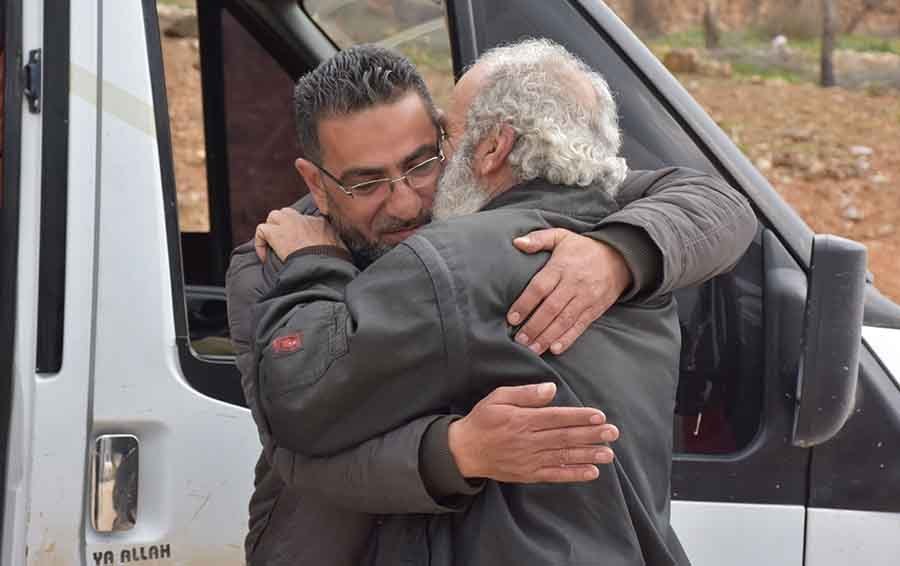
Detainees released by the Syrian regime during a swap deal in Aleppo – February, 2019 (Anadolu Agency)
Poll: Exchange deals are not beneficial for the cause of the detainees
A poll conducted by Enab Baladi on Facebook showed that most of the participants mistrust the detainees’ exchange deals held between the regime and the opposition under the Astana talks.
66 percent of the 480 respondents found that these deals did not help support the release of the detainees, compared to 34 percent who were optimistic about the whole process.
Alaa Mukhtar, one of the subscribers who responded to the poll, considered that these exchange deals are meant to serve personal interests. Each party “asks for the release of its relatives, while Ammar Numan believed that these exchange operations can end the sufferings of the detainees on both sides.
On the other hand, Noureddine asked about the utility of the presence of the regime’s detainees in the opposition’s prisons, considering that releasing them in exchange for liberating civilian detainees in the prisons of the regime is a better option.
Civil Rights organizations sensing the danger of the Working Team
On 20 January, 2018, 11 human rights organizations met- one month after the announcement of the Working Team on the Syrian detainees held by the eighth round of Astana- out of concern about the established link between the file of the detainees and the political process.
The meeting was attended by representatives of various organizations, including the Detainees’ Voice, the STJ, and the Syrian Center for Statistics and Research, Syrian Network for Human Rights, Start Point, and Urnammu for Justice and Human Rights.
Additionally, other NGOs were present during the gathering, namely, “ Save the Rest” campaign, the Syrian Center for Media and Freedom of Expression, Basamat (Prints) for Development, the Syrian Association for Missing and Conscience Detainees and the Association of Detainees and Missing Persons in Sednaya Prison.
Yasmine al-khaled, member of Save the Rest campaign, told Enab Baladi that a letter was sent to the head of the Syrian opposition delegation to the Astana talks Ahmed Tomah. It contained the determinants and arguments about the mechanism of action in the file, amid fear of exploiting the case by Russia.
The most important determinants, included in the letter, were the call to disconnect the file from the political track and preserve its human rights aspect, as stipulated by international resolutions. Al-Khaled also stressed the need to avoid “being dragged into the trap of making lists for the detainees, as listing their names has proved to be negative and ineffective as demonstrated during the Geneva II negotiations. According to al-Khaled, the detainees file needs to be handled by technical and legal experts in cooperation with representatives of the concerned civil society organizations.
The letter also included warnings of converting the detainees file into mere swaps, and highlighted “the necessity to uphold the need for the immediate and unconditional release of all detainees; thus, most importantly, to deal with the file under neutral and multilateral international sponsorship so as to protect it from political and reconciliation disputes”.
Al-Khaled indicated that the aforementioned organizations reached the conclusion that “the detainees lists cannot be considered as a working mechanism anymore since it proved to be a failed approach, which the regime can manipulate and exploit”. Al-Khaled noted:”We are not ready to submit any list. On the other hand, pressures must be exerted to push the regime to release its lists”.
according to al-Khaled, following the formation of the working team on the detainees file, civil rights organizations tried to communicate with the head of the delegation, pointing out that the concerns are directed towards “Russia’s willingness to lead the file, and that the opposition will take it to Astana and legitimize it without being aware of the future of the file, which will put the detainees at risk”.
Al-khaled called on discussing the file impartially and under international auspices, in addition to allowing civil society and relevant organizations, “which know how to deal with such a delicate matter”, to be involved. He asserted that “the formation of the Working Group raised our fears and gave us no hope at all”.
She explained that Tomah “welcomed the proposal and was open during the conversation, promising to study the letter in depth, i.e. in relation to the mechanism of work during the talks”. However, she talked about the lack of any guarantees, as the path surrounding the file is full of question marks, most notably: What tools should be used to verify the file?
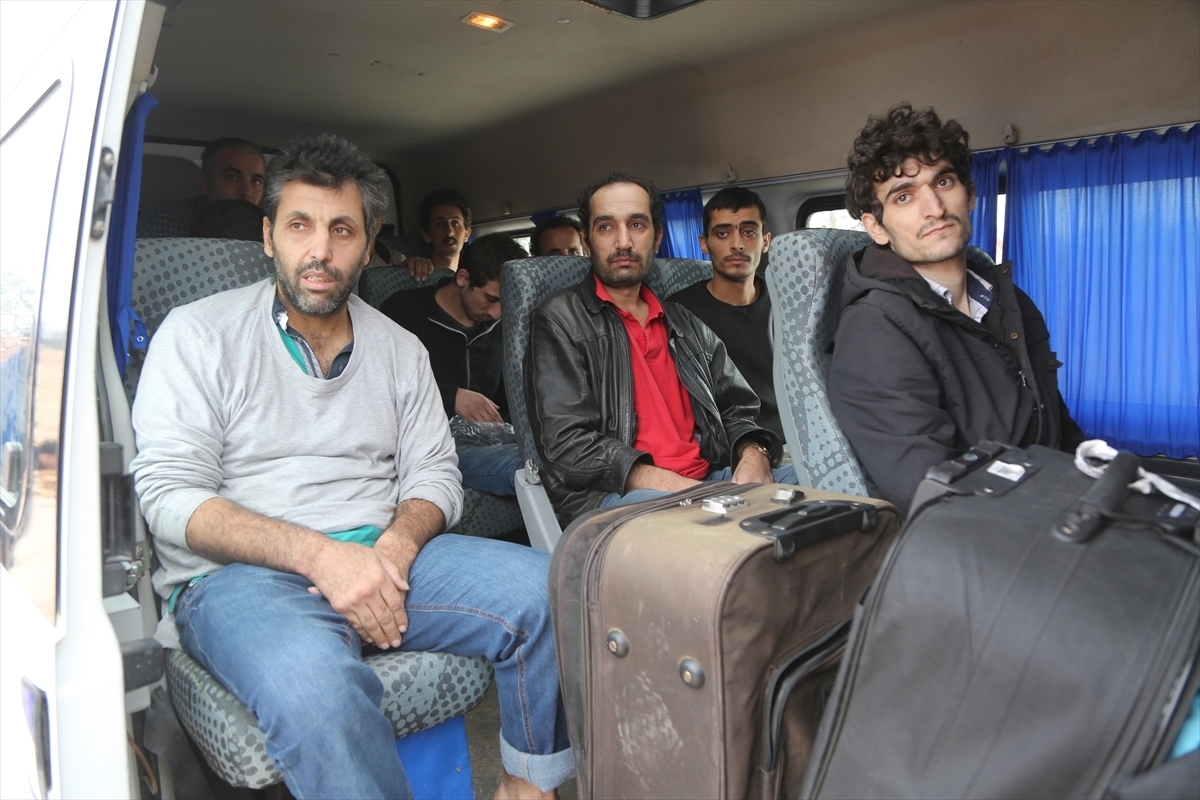
Released prisoners during a swap deal between the regime and opposition in the countryside of Aleppo- November, 2018 (AFP)
Swap deals conducted under the Astana talks
First Test
The first exchange deal took place on 24 November, 2018. The Syrian regime released 20 detainees from its prisons in return for 10 prisoners captured by the opposition. The exchange took place in the city of al-Bab, east of Aleppo.
The media spokesman for the opposition delegation to Astana, Ayman al-Asami, said that the operation was “a test to open the file of detainees in a practical way. The release acts were concurrent, and it was not an exchange as we reject this kind of swaps”.
Al-Asami explained to Enab Baladi that those who have been released by the regime are civilians and members of the army, and were not associated with any particular group.
Swap deal in February
The second exchange deal took place three months after the first test, on 12 February, 2019. The Syrian regime released 20 detainees in return for receiving its prisoners captured by the opposition factions.
Enab Baladi‘s correspondent in the countryside of Aleppo, then, indicated that among the released detainees there were ten women, including five women from Homs and two others with their children.
The correspondent quoted sources familiar with the exchange process saying that the released detainees included Houyam Halawani, Alaa Haj Hassan, Amira Habijan, Bashira Habijan, and Nimaa Ajam.
Third-time Prisoners exchange
The third exchange deal was undergone on Monday, 22 April, 2019. Opposition factions and al-Assad forces conducted a swap in Deir Qaq in the eastern countryside of Aleppo, ahead of the 12th round of the Astana talks.
Enab Baladi‘s correspondent explained that nine opposition prisoners were swapped by the opposition for other nine detainees of the regime, in the presence of a delegation from the United Nations and the Turkish side.
if you think the article contain wrong information or you have additional details Send Correction
النسخة العربية من المقال
-
Follow us :
Most viewed
- Al-Sharaa names new Syrian government
- Intentions for popular resistance amid Israeli escalation in southern Syria
- Kurdish Protection Units: Key point of contention between Damascus and SDF
- Syrians look forward to visiting graves of "martyrs" on Eid morning
- Eid clothing prices rise in Idlib: Predominantly priced in dollars












 Prisoners released in swap deal between the regime and the opposition in Aleppo countryside - November 2018 (AFP)
Prisoners released in swap deal between the regime and the opposition in Aleppo countryside - November 2018 (AFP)





 A
A
A
A
A
A
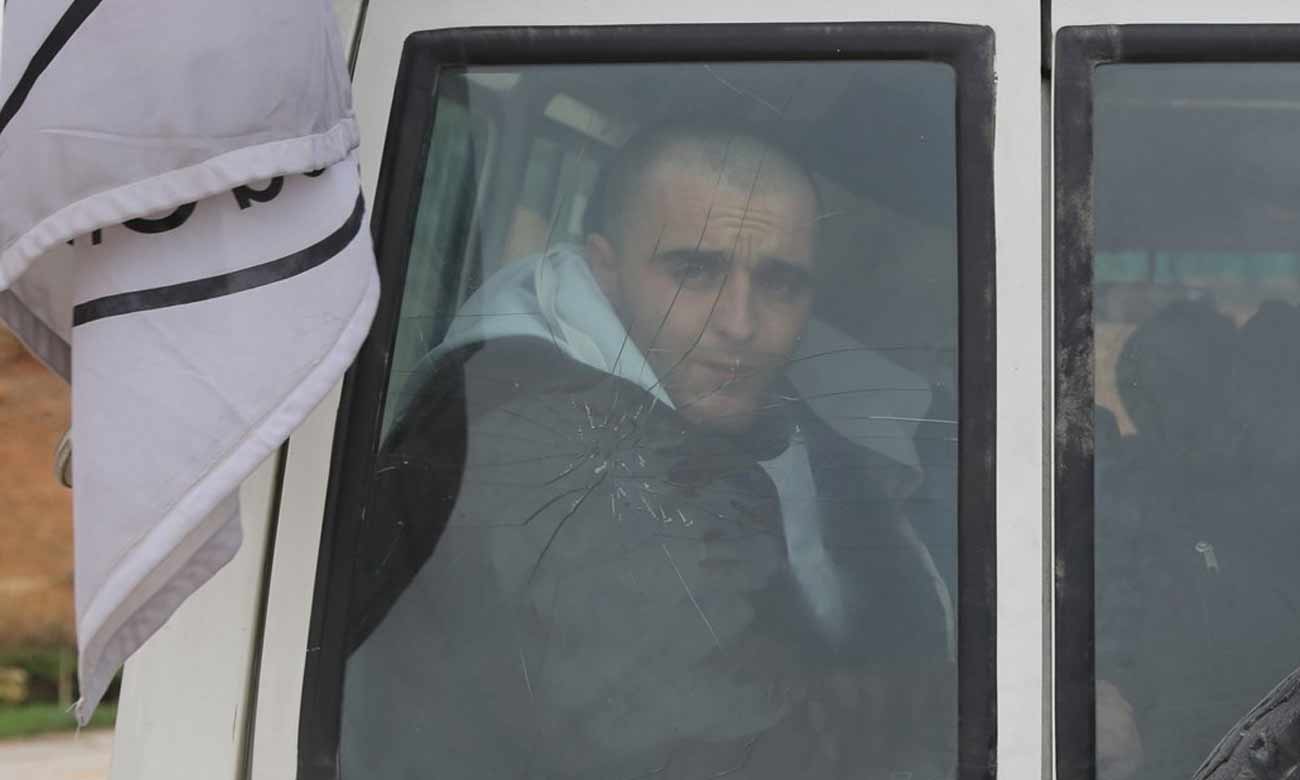
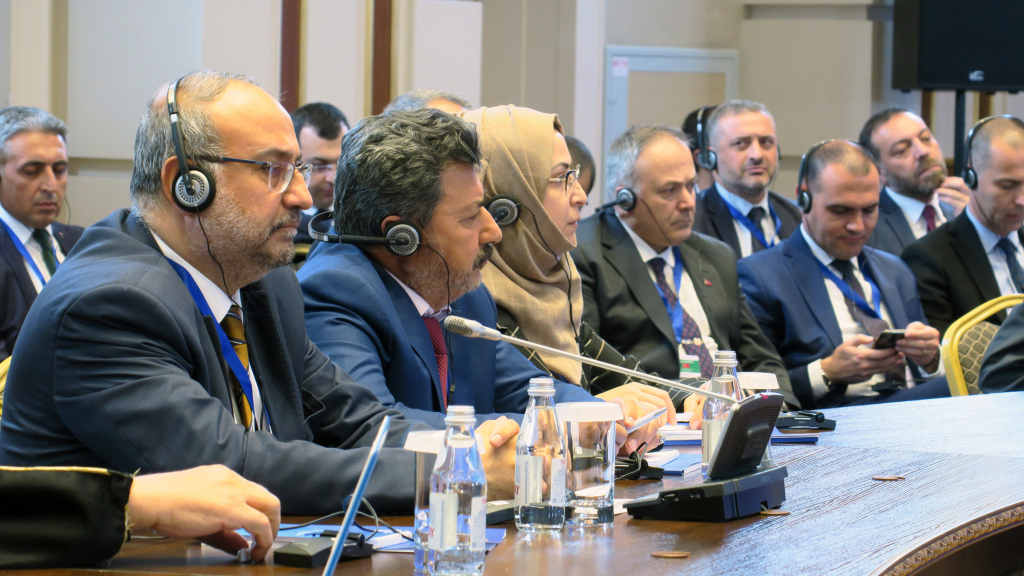
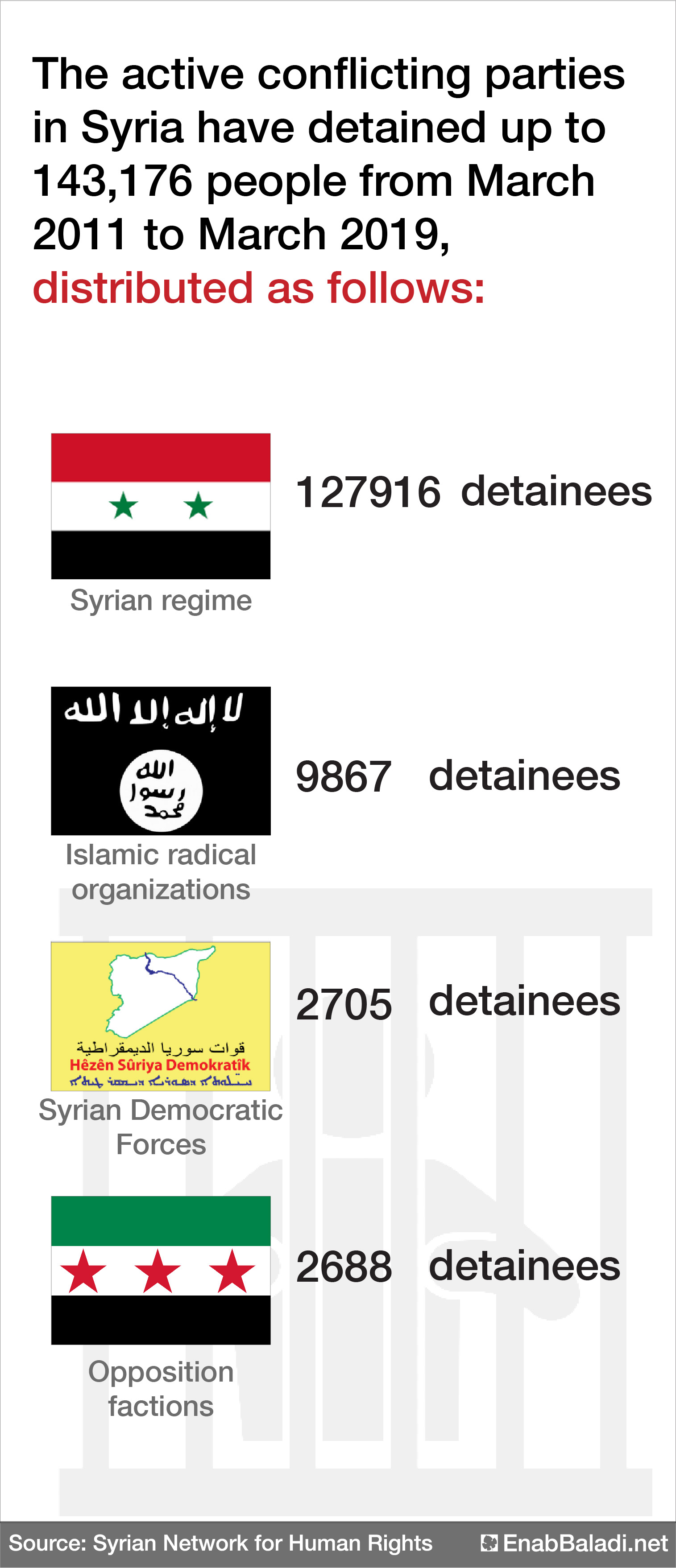
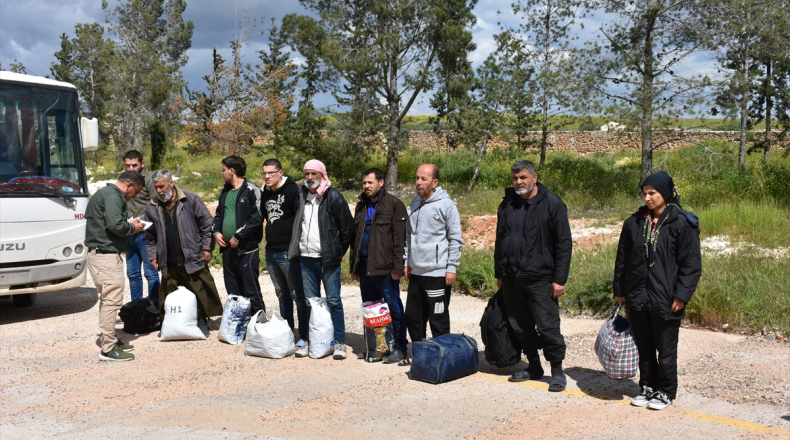







 More In-Depth
More In-Depth